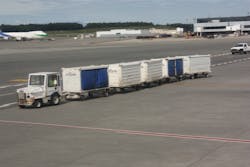It takes a remarkable amount of teamwork to get a passenger’s bag from check-in to the carousel at that person’s destination.
Those intimately involved in the ground support industry can appreciate the amount of planning and coordination that goes into baggage handling. But a passenger only cares about whether his or her bag has successfully made the journey. So, reducing the number of mishandled bags continues to be a critical focus for airlines, airports and ground service providers.
It’s understandable that the International Air Transport Association (IATA) recently endorsed a resolution during its 75th Annual General Meeting (AGM) supporting the use of radio frequency identification (RFID) technology to enhance the industry’s ability to track luggage.
According to SITA’s annual baggage report, less than 0.6 percent of more than 4 billion bags were mishandled last year. Yet, RFID capabilities allow bags to be identified and tracked without the need for human intervention, which could help improve accuracy further.
In a video interview from the AGM, IATA’s SVP of airports, passenger, cargo and security Nick Careen explains the initiative’s importance for all parties involved.
“It’s necessary because we’ve been able to improve the processes of baggage to a certain point. In order to be able to get it to the next level, we need to track them 100 percent of the time,” he says.
“It’s also important because our customers want us to do this,” Careen continues. “In our global passenger surveys, the statistics are compelling. Nearly 80 percent of customers are saying they want us to track the bags.
“And even further to that, there are efficiencies to be gained by being able to utilize the data that we would garner from this to improve the processes even further when it comes to handling baggage.”
In addition to supporting RFID technology, IATA is also calling for the implementation of modern baggage messaging standards, which the association believes will help improve the accuracy of baggage tracking in real time across multiple points of the item’s journey.
The resolution implores airlines to “transition to bar-coded bag tags with RFID inlays and use RFID data alerts to enact processes with airports and ground handlers that prevent potential mishandlings.”
In his video interview at the AGM, Careen describes the implementation as “a passive tag that readers would pick up throughout the chain as the bags move through our airports and our aircraft.”
According to IATA, RFID read rates are accurate up to 99.98 percent – significantly outperforming barcodes. IATA adds that when RFID capabilities and modern messaging standards are combined, the mishandling rate could be reduced by as much as 25 percent.
“Passengers want to arrive with their bags. And on the rare occasion when that does not happen, they want to know exactly where their bag is,” IATA ‘s director general and CEO, Alexandre de Juniac explains, in the resolution. “Deploying RFID and adopting modern baggage messaging standards will help us to cut mishandlings by a quarter and recover bags that are mishandled more quickly.”
While there are no specific timelines for the technology to become mandated, IATA anticipates acceptance rates to be high, noting in the resolution “global adoption of RFID could be achieved within four years.”
“For the next steps, instead of putting hard dates on it, all of our airlines – as illustrated in passing the resolution, want to do this,” Careen says in the AGM video interview. “The business case is sound and our customers want it as well, so we believe that it’s not necessary to set a date.”
In addition to better baggage tracking, IATA also points to improved aircraft loading and off-loading; simplified adoption of IATA Resolution 753 and enhanced data consistency as benefits for RFID adoption.
For adoption to be successful, however, IATA officials note there must be cooperation between multiple parties. That means airports must incorporate RFID technology capabilities into infrastructure and implement modern baggage messaging standards, and ground handlers need to replace manual tracking operations with RFID options when possible.
“In order to do that, there needs to be a lot of collaboration and cooperation as we move forward,” Careen adds, while also pointing out manufacturers will need to be prepared.
About the Author
Josh Smith
Editor
Josh Smith served as editor of Ground Support Worldwide as editor from 2016 through 2024. He oversaw production of the print magazine, created GSW's newsletters on a daily basis, and updated the latest news on AviationPros.com.

